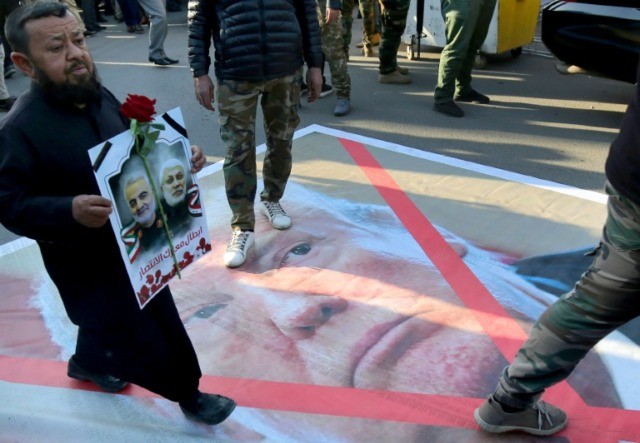Baghdad (AFP) – US President Donald Trump’s threat to sanction Iraqis “like they’ve never seen before” if Baghdad kicks out American troops has brought back haunting memories of a decade under international embargo.
“If the US imposes sanctions on Iraq, the dinar will plummet and we’ll be sent back to the past, to the days of the economic embargo,” said Hisham Abbas, an Iraqi shopping in a commercial district of the capital.
On Sunday, Iraq’s parliament voted to urge the government to oust foreign troops from its soil, among them some 5,200 US troops helping local forces beat back jihadists.
Trump quickly slammed the decision.
“If they do ask us to leave — if we don’t do it in a very friendly basis — we will charge them sanctions like they’ve never seen before,” he said.
“It’ll make Iranian sanctions look somewhat tame.”
Under ex-dictator Saddam Hussein, Iraq was put under crippling global sanctions and an oil embargo seen as the toughest in history, cutting off trade and financial interactions with the outside world.
Its GDP was slashed in half, the Iraqi dinar collapsed and dozens of factories shuttered, leaving families relying on ration cards and slim salaries.
The measures were lifted in the years following the US-led invasion in 2003 and Iraq’s economy has slowly tried to reintegrate with the rest of the world.
It is now OPEC’s second-biggest crude producer and living standards have risen — most Iraqis own imported clothes, phones, cars and computers.
– Sanctions ‘nuclear option’ –
But after Trump’s comments, bitter memories of shortages and collapsed currencies came rushing back.
“Everything the Iraqi people suffered in the 1990s will come back. The economic embargo will come back,” worried Saleh, a middle-aged Iraqi with a thick mustache.
“It’ll be like the era of Saddam Hussein, and worse. There won’t be any cash left,” said Samer, another shopper.
The US has been particularly angered in recent months by repeated rocket attacks targeting the US embassy and American troops.
In response to those attacks, a senior US official at the Baghdad embassy told AFP months ago that Washington was considering a range of ways to ramp up pressure on Iraq.
“One possibility is sanctions, and limiting the cash that comes into Iraq. That would be the nuclear option,” the official said.
The US has already blacklisted Iraqi nationals, armed groups and even banks for their ties to Tehran and has hinted more sanctions are coming.
But they have so far left alone Iraq’s oil revenues, which make up more than 90 percent of the state’s budget.
US and Iraqi officials previously told AFP that an oil embargo, like the one imposed now on Iran, would be too hurtful to a country considered an ally by Washington.
The US has so far sought to shield Iraq from the impact of its energy sanctions on Tehran by granting Baghdad a waiver to keep importing Iranian electricity.
– ‘Delusional’ –
But Sunday’s vote could change all that.
“One of the steps the international community could take would be halting financial interactions with Iraq,” speaker Mohammad Halbusi told MPs during the session.
“We would no longer be able to keep up our commitments to Iraqi citizens,” he warned.
In his comments on Sunday, Trump went further than just sanctions, threatening to make Iraq reimburse Washington for a “very extraordinarily expensive” base hosting US troops.
“We’re not leaving unless they pay us back for it,” he said.
The president did not specify which base but he visited US troops in late 2018 at Ain al-Assad, built in the 1980s.
“Iraqis feel humiliated, and rightly so, by the latest claims by Donald Trump on reimbursement,” said Karim Bitar of the Paris-based Institute of International and Strategic Relations.
“It’s delusional. It is reminiscent of Trump wanting to make Mexico pay for building the wall.”

COMMENTS
Please let us know if you're having issues with commenting.